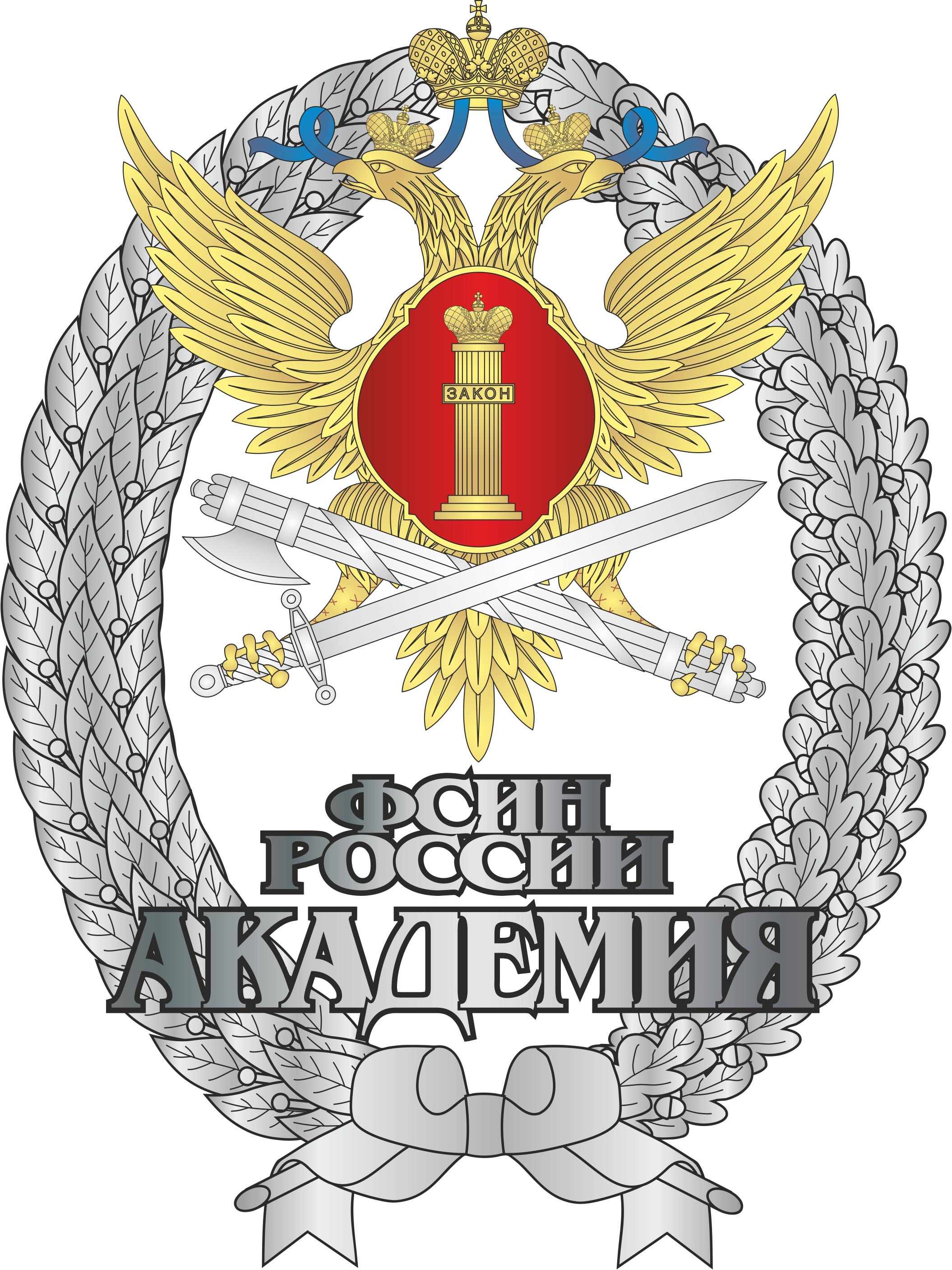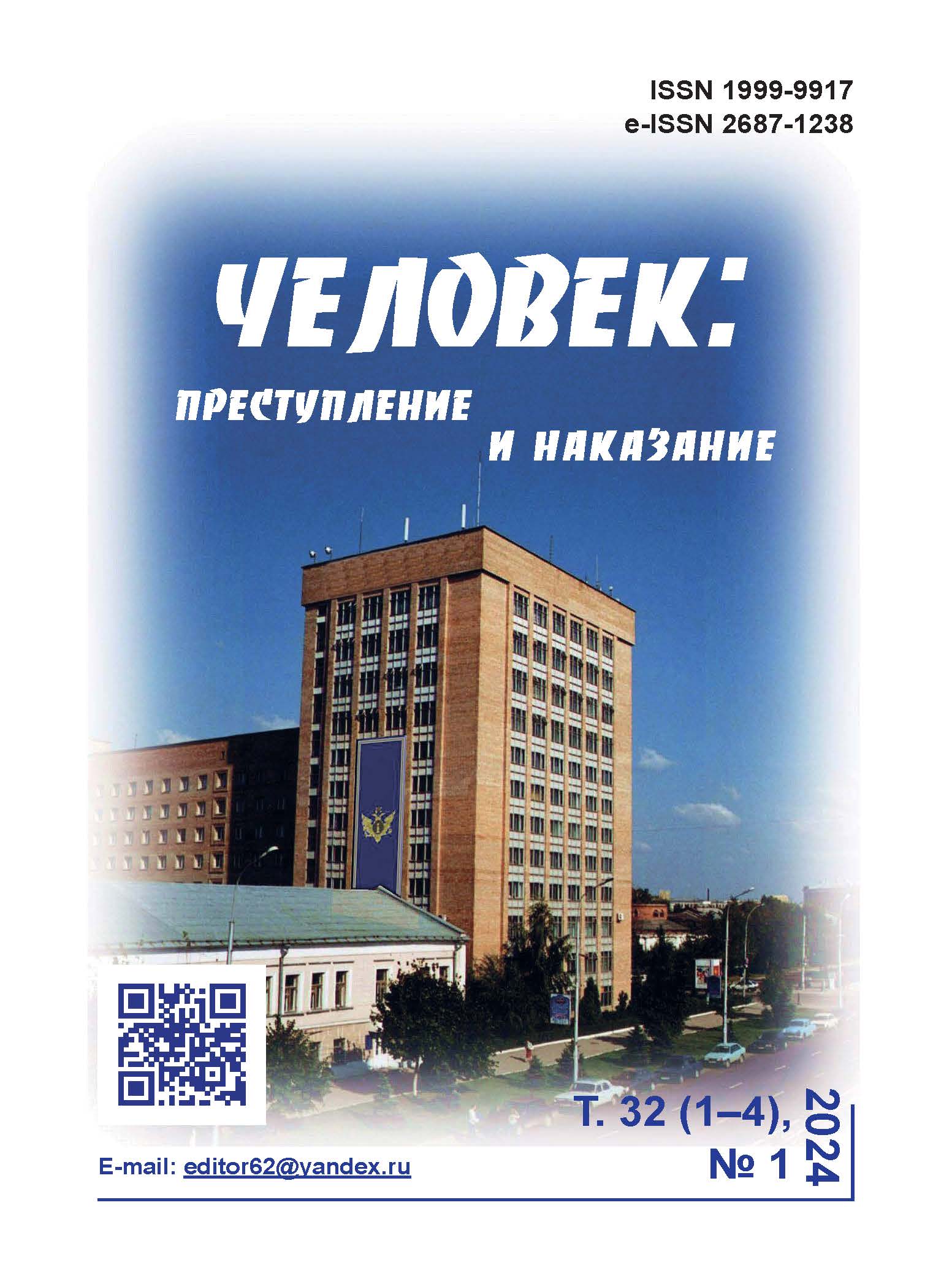UDC 343.85
The article presents the results of a study of the criminal humane motive of juvenile offenders as an internal motivation aimed at bringing benefit, doing good to other people in a way prohibited by law, as well as diagnostics of other personal qualities and properties of juvenile offenders that influence the formation of a criminal humane motive. The results of comparing the data obtained with the corresponding indicators of law-abiding minors are demonstrated. As psychodiagnostic tools, a specialized author's technique for diagnosing potential motives of delinquent property behavior of minors and non-specialized methods for diagnosing general motivation are used: “Pyramid of Needs” (V. V. Skortsov), “Proverbs” (S. M. Petrova) and “Method for diagnosing the motivational structure of personality” (V. E. Milman). The results obtained are of practical importance in the development and implementation of rehabilitation and preventive programs by subjects of juvenile delinquency prevention.
juvenile delinquency, motive of crime, needs of juvenile offenders, criminal humane motive, diagnosis of motives of criminal behavior, prevention of juvenile delinquency
1. Gor'kovaja, I. A. 2020, ‘Directions of prevention of illegal behavior of adolescents in Russia’, Human psychology in education, vol. 2, iss. 3, pp. 265–276. DOI: https://doi.org/10.33910/2686-9527-2020-2-3-265-276; EDN: https://elibrary.ru/JMYBKV
2. Antonjan, Ju. M. 2021, ‘Some fundamental possibilities for correcting convicts’, Man: crime and punishment, vol. 29, iss. 3, pp. 327–335. DOI: https://doi.org/10.33463/2687-1238.2021.29(1-4).3.327-335; EDN: https://elibrary.ru/HWWINS
3. Vasil'eva, N. V. & Gor'kovaja, N. V. 1997, Forensic examination and its clinical and psychological foundations, Baltic Pedagogical Academy, St. Petersburg. EDN: https://elibrary.ru/SIWVNH
4. Konovalova, I. A. 2007, Criminological characteristics of mercenary juvenile delinquency, MGOU, Moscow. EDN: https://elibrary.ru/QQSBPN
5. Loginova, K. Ju. 2015, Juvenile property crime and measures to prevent it: PhD thesis (Law), Tomsk. EDN: https://elibrary.ru/ZPUPRH
6. Ustinov, D. V. 2020, ‘The problem of taking into account psychological constructs in the formation of the concept of a crime motive’, Psychologist, iss. 3, pp. 37–52. DOI: https://doi.org/10.25136/2409-8701.2020.3.32570; EDN: https://elibrary.ru/XTVJTR
7. Il'in, E. P. 2013, Psychology of help. Altruism, selfishness, empathy, Piter, St. Petersburg. EDN: https://elibrary.ru/TQZJRN
8. Ustinov, D. V. & Safuanov, F. S. 2023, ‘Methodology for diagnosing potential motives of illegal property behavior of minors’, Applied legal psychology, iss. 1(62), pp. 39–50. DOI: https://doi.org/10.33463/2072-8336.2023.1(62).039-050; EDN: https://elibrary.ru/OLTEFA
9. Mil'man, V. Je. 2005, Motivation for creativity and growth (structure, diagnosis, development): theoretical, experimental and applied research of the dialectic of creation and consumption, Mireja i K°, Moscow.
10. kvorcov, V. V. 2019, Psychology of leadership and subordination, Delo, Moscow.
11. Akindinova, I. A. 2000, Features of self-actualization of personality in professions of various levels of social prestige: PhD thesis (Psychology), St. Petersburg. EDN: https://elibrary.ru/NLTMJF
12. Petrova, S. M. 1995, Motivational conditioning of the Self-concept of personality in adolescence: PhD thesis (Psychology), St. Petersburg. EDN: https://elibrary.ru/ZLHRAJ
13. Safuanov, F. S. 2021, Forensic psychological examination: textbook, Yurayt, Moscow. EDN: https://elibrary.ru/QMRMHG
14. Ustinov, D. V. 2018, ‘The content of the need as a criterion for classifying the motives of illegal property behavior of children’, Psychology and Law, vol. 8, iss. 1, pp. 63–76. DOI: https://doi.org/10.17759/psylaw.2018080105; EDN: https://elibrary.ru/YSTZMC
15. Anikina, V. G. 2021, ‘A dialogical approach to the development of a model of reflection as a mechanism of interpersonal perception’, Cognition and experience, vol. 2, iss. 2, pp. 53–67. DOI: https://doi.org/10.51217/cogexp_2021_02_02_03; EDN: https://elibrary.ru/JBSJBE
16. Arapova, P. I. 2019, ‘Overcoming difficulties in school years’, in A. I. Savenkov (ed.), A child in the modern educational space of a megalopolis: collection of materials of the scientific and practical conference, pp. 139-144, Moscow City Pedagogical University, Moscow. EDN: https://elibrary.ru/HCVNMU
17. Lokatkova, O. N. 2022, ‘Features of child-parent relations and their influence on the formation of conflict behavior in adolescence’, Scientific Notes of the P. F. Lesgaft University, iss. 8(210), pp. 473–477. DOI: https://doi.org/10.34835/issn.2308-1961.2022.8.p473-477; EDN: https://elibrary.ru/JMGJOW
18. Konovalova, A. M. 2020, ‘Factors related to the disrespectful attitude of adolescents towards their parents’, Bulletin of the Moscow University, Series 14, Psychology, iss. 3, pp. 69–87. DOI: https://doi.org/10.11621/vsp.2020.03.04; EDN: https://elibrary.ru/RBRYPH
19. Mymrikova, A. I. & Istratova, O. N. 2010, ‘Psychological dependence on parents in older adolescence, causes and consequences of its occurrence’, Izvestija JuFU, Technical sciences, iss. 10 (111), pp. 209–214. EDN: https://elibrary.ru/MWLQYJ
20. Letunova, A. L. & Slepuhina, G. V. 2019, ‘Features of communication between modern teenagers and their peers’, Meridian, iss. 12 (30), pp. 270–272. EDN: https://elibrary.ru/SVPYYU
21. Dubovskaja, E. M. & Zhernakova, D. A. 2022, ‘Comparative analysis of the concepts of "real" and "virtual" teenage friendship', New psychological research, vol. 2, iss. 3, pp. 110–133. DOI: https://doi.org/10.51217/npsyresearch_2022_02_03_06; EDN: https://elibrary.ru/QYERGO
22. Kon, I. S. 2005, Friendship, Piter, St. Petersburg.
23. Kuznecova, I. V. 2006, The motive of affiliation in interpersonal relationships: PhD thesis (Psychology), St. Petersburg. EDN: https://elibrary.ru/NNUFKX
24. Serdjukova, E. F., Shapovalova, M. L. & Hrebina, S. V. 2021, ‘The need for affiliation in adolescents with different levels of shyness’, International Journal of Medicine and Psychology, vol. 4, iss. 7, pp. 20–26. EDN: https://elibrary.ru/XKLZQP
25. Troickaja, E. A. 2018, ‘Features of empathy in a multicultural environment’, Bulletin of the Moscow State Linguistic University. Education and pedagogical sciences, iss. 6(814), pp. 217–229. EDN: https://elibrary.ru/CUOGYM
26. Shalaginova, K. S. & Dekina, E. V. 2021, ‘Features of working with at-risk adolescents on the formation of personal responsibility’, The World of Science. Pedagogy and psychology, vol. 9, iss. 3, viewed 6 August 2023, https://mir-nauki.com/PDF/02PSMN321.pdf. EDN: https://elibrary.ru/DPHOHA
27. Ovchinnikova, Ju. E. 2017, ‘The development of higher social feelings as the basis of psychological security in the youth environment’, in O. I. Shherbakov & L. V. Shukshina (eds), A safe educational environment in the changing conditions of modern society: collection of materials of the II International Scientific and Practical Conference, pp. 73–77, IP Afanas'ev V. S., Moscow. EDN: https://elibrary.ru/ZCKHIH
28. Maksimov, L. V. 2018, ‘Moral Duty: the Problem of Justification’, Philosophical Thought, iss. 12, pp. 35–45. DOI: https://doi.org/10.25136/2409-8728.2018.12.28213; EDN: https://elibrary.ru/YSRLNZ
29. Pazuhina, S. V., Shalaginova, S. V. & Dekina, E. V. 2021, ‘Social and personal responsibility as the basis for the formation of a teenager at risk as a subject of self-development’, Prospects of science and education, iss. 6(54), pp. 342–362. DOI: https://doi.org/10.32744/pse.2021.6.23; EDN: https://elibrary.ru/UBZMDJ
30. Tereshhenko, Je. V., Makadej, L. I. & Osipova, N. V. 2022, ‘The perception of the family by deviant teenagers’, Problems of modern pedagogical education, iss. 77-3, pp. 279–283. EDN: https://elibrary.ru/NUWOIE
31. Zorina, N. S. 2023, ‘On the issue of the criminalistic characterization of the personality of a juvenile offender’, Law and the State: Theory and practice, iss. 4(220), pp. 307–308.
32. Posohova, S. T., Akindinova, I. A. & Konopleva, E. A. 2021, ‘The structure of emotional comfort of adolescents in the information environment’, in Life trajectories of personality in the modern world: social and individual context: collection of articles of the I International Scientific and Practical Conference, pp. 85-89, Kostroma State University, Kostroma. EDN: https://elibrary.ru/SASKYC
33. Semenova, A. V. 2020, ‘Personal characteristics in adolescence and adolescence’, Pedagogy: history, prospects, vol. 3, iss. 3, pp. 74–83. DOI: https://doi.org/10.17748/2686-9969-2020-3-3-74-83; EDN: https://elibrary.ru/CPVNTX
34. Gusev, A. N. 2008, 1C: School Psychodiagnostics. The basic version. Guidelines for the use of methods by psychologists of educational institutions, Firma 1S, Moscow.









